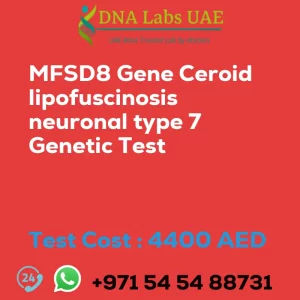CPT2 Gene Carnitine palmitoyltransferase 2 deficiency infantile Genetic Test
Test Name: CPT2 Gene Carnitine palmitoyltransferase 2 deficiency infantile Genetic Test
Components: Blood or Extracted DNA or One drop Blood on FTA Card
Price: 4400.0 AED
Report Delivery: 3 to 4 Weeks
Method: NGS Technology
Test type: Metabolic Disorders
Doctor: General Physician
Test Department: Genetics
Pre Test Information: Clinical History of Patient who is going for CPT2 Gene Carnitine palmitoyltransferase 2 deficiency, infantile NGS Genetic DNA Test A Genetic Counselling session to draw a pedigree chart of family members affected with Carnitine palmitoyltransferase 2 deficiency, infantile
Test Details
CPT2 gene, also known as carnitine palmitoyltransferase 2, is a gene that provides instructions for making an enzyme called carnitine palmitoyltransferase 2. This enzyme is involved in the breakdown of long-chain fatty acids for energy production within cells.
Carnitine palmitoyltransferase 2 deficiency (CPT2 deficiency) is a rare genetic disorder characterized by impaired fatty acid metabolism. This condition can present in different forms, including an infantile form. Infantile CPT2 deficiency typically manifests within the first few months of life. It is characterized by symptoms such as muscle weakness, low muscle tone (hypotonia), liver problems, and episodes of metabolic crises triggered by fasting or illness. These metabolic crises can lead to severe complications, including liver failure, seizures, and even death.
To diagnose CPT2 deficiency, a genetic test called Next-Generation Sequencing (NGS) can be performed. NGS is a technique that analyzes multiple genes simultaneously, providing a comprehensive evaluation of the genetic code. In the case of CPT2 deficiency, NGS can identify mutations or changes in the CPT2 gene that are responsible for the condition.
Genetic testing for CPT2 deficiency is typically recommended when an infant presents with symptoms suggestive of the condition. Confirming the diagnosis through genetic testing can help guide treatment and management strategies, as well as provide information for family planning and genetic counseling.
It is important to note that CPT2 deficiency is a complex condition, and genetic testing should be interpreted by a healthcare professional with expertise in genetics and metabolic disorders.
| Test Name | CPT2 Gene Carnitine palmitoyltransferase 2 deficiency infantile Genetic Test |
|---|---|
| Components | |
| Price | 4400.0 AED |
| Sample Condition | Blood or Extracted DNA or One drop Blood on FTA Card |
| Report Delivery | 3 to 4 Weeks |
| Method | NGS Technology |
| Test type | Metabolic Disorders |
| Doctor | General Physician |
| Test Department: | Genetics |
| Pre Test Information | Clinical History of Patient who is going for CPT2 Gene Carnitine palmitoyltransferase 2 deficiency, infantile NGS Genetic DNA Test A Genetic Counselling session to draw a pedigree chart of family members affected with Carnitine palmitoyltransferase 2 deficiency, infantile |
| Test Details |
CPT2 gene, also known as carnitine palmitoyltransferase 2, is a gene that provides instructions for making an enzyme called carnitine palmitoyltransferase 2. This enzyme is involved in the breakdown of long-chain fatty acids for energy production within cells. Carnitine palmitoyltransferase 2 deficiency (CPT2 deficiency) is a rare genetic disorder characterized by impaired fatty acid metabolism. This condition can present in different forms, including an infantile form. Infantile CPT2 deficiency typically manifests within the first few months of life. It is characterized by symptoms such as muscle weakness, low muscle tone (hypotonia), liver problems, and episodes of metabolic crises triggered by fasting or illness. These metabolic crises can lead to severe complications, including liver failure, seizures, and even death. To diagnose CPT2 deficiency, a genetic test called Next-Generation Sequencing (NGS) can be performed. NGS is a technique that analyzes multiple genes simultaneously, providing a comprehensive evaluation of the genetic code. In the case of CPT2 deficiency, NGS can identify mutations or changes in the CPT2 gene that are responsible for the condition. Genetic testing for CPT2 deficiency is typically recommended when an infant presents with symptoms suggestive of the condition. Confirming the diagnosis through genetic testing can help guide treatment and management strategies, as well as provide information for family planning and genetic counseling. It is important to note that CPT2 deficiency is a complex condition, and genetic testing should be interpreted by a healthcare professional with expertise in genetics and metabolic disorders. |








